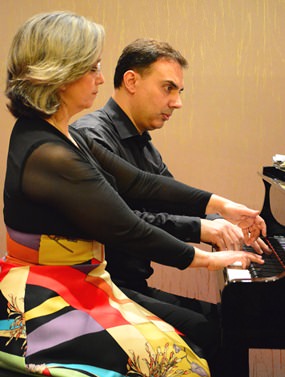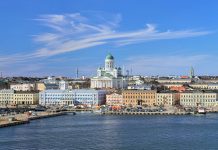The colourful rhythms of Spanish music filled the recital room at Pattaya’s Intimate Hotel last week in a piano recital given by the renowned Spanish piano duo, Carles Lama and Sofia Cabruja. Presented by D & M Music Studio in cooperation with Siam Ratchada Auditorium, the concert featured music by Spanish composers Granados and de Falla as well as works by Ravel and Rachmaninov.
Carles Lama and Sofia Cabruja are a husband-and-wife team and they have been making music together since 1987. They’re based in their home-town of Girona, an old and picturesque city lying almost exactly a hundred kilometers north-east of Barcelona. From this town in Catalonia, Carles and Sofia have travelled the world in recent years, giving concerts in Paris, London, Prague, Belgrade, Tokyo, Kuala Lumpur, St. Petersburg, Moscow and New York. The concert at the Intimate Hotel marked the start of their first Thailand tour which also included concerts in Bangkok, Chiang Mai and Hua Hin.
 Carles Lama and Sofia Cabruja brought the spirit and sounds of Spain to the Intimate Hotel in Pattaya.
Carles Lama and Sofia Cabruja brought the spirit and sounds of Spain to the Intimate Hotel in Pattaya.
The first half of the concert was devoted to Goyescas, a work by Granados with a fascinating history. It was composed in 1911 as a suite for solo piano inspired by the paintings of Francisco Goya. A few years later in 1915 Granados wrote a one-act opera of the same name using melodies from the piano suite. It was first performed at the Metropolitan Opera in New York City on 28th January, 1916. Exactly one hundred years later on 28th January 2016, Carles Lama and Sofia Cabruja gave the Carnegie Hall premiere of a suite for piano duo based on music from the opera by the contemporary Spanish composer Abraham Espinosa.
It’s attractive, engaging music and thoroughly Spanish. The explosive opening of the first movement El Pelele was given a well-articulated and superbly rhythmical performance by Carles and Sofia and several of the melodies had a strangely familiar ring, though I don’t recall hearing the work before.
The declamatory opening of the Intermezzo leads into a lyrical waltz, played with beautiful phrasing and movement. The third movement, El Baile del Candil was notable for the excellent dynamic control and the impeccable sense of ensemble. The last two movements were highlights of the concert. La Maja y el Ruiseñor with its reflective ornamental opening and its melancholy melody was given a moving and thoughtful performance while the finale, Los Requiebos contains and deliciously unexpected twists of harmony.
Carles and Sofia gave a splendid performance of this difficult and challenging work which they told me, is more technically demanding than the original solo piano suite. Both pianists have a power of communication, a remarkable sense of synchronization and a superb technical ability.
The second half of the concert began with a four-hand arrangement of the slow movement from Rachmaninov’s well-known Symphony No 2. The movement contains one of the composer’s best-known melodies and the pianists gave a compelling performance of the work with a fine sense of phrasing and some splendidly smooth legato playing. Even so, their next piece, Ravel’s La Valse seemed more suited to the piano. It began life in 1906 as an orchestral work, originally intended as a tribute to the waltzes of Johann Strauss but Ravel eventually adapted it for a new ballet being produced by Diaghilev.
Although the infectious and slightly surreal waltz theme dominates the work, there’s sometimes a darker undercurrent and a brooding character in the music which has led many to assume that the work perhaps has a more profound significance. It was another highlight of the concert, a technically brilliant performance full of bravado, faultless articulation and a compelling sense of pace and movement.
The final works on the programme were two well-known dances from Manuel de Falla’s opera La Vida Breve and very rewarding they were too. Carles and Sofia provided a thrilling performance of the rhythmic, infectious and colourful music and played with superb articulation and control. The performance and the music, like the Granados suite that opened the programme seemed to reach to the soul of Spain.




